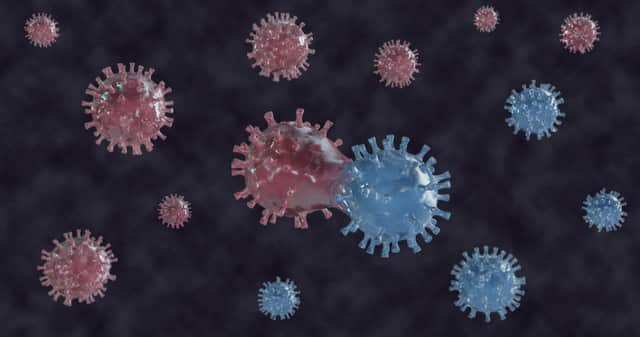Covid mutations sound scary, but there’s no need to panic - a virologist explains


“People should be wary of what they read when it comes to mutations.”
The word ‘mutation’ may instil fear in many, as the term is often associated with science fiction and disaster movies, but in the life cycle of a virus, mutation is a natural occurrence.
Advertisement
Hide AdAdvertisement
Hide AdOn 22 November, UK scientists revealed that they were monitoring 4,000 mutations of Covid-19, with some concern that the new strains may resist vaccines.
Earlier in November, a mutated strain of coronavirus made headlines, after study findings revealed the version was potentially more infectious than the original, and had been detected in several areas worldwide.
But is a mutated virus strain really more dangerous, and should you be concerned?
What is a virus mutation?
A mutation is a change in a virus’s genome. Genomes are the set of genetic instructions that house all the information the virus needs to function.
Advertisement
Hide AdAdvertisement
Hide AdMutations happen when the virus makes contact with a host and starts to replicate. The set of instructions is then copied, but mistakes can often happen in the process. Where the errors occur within the genome will determine whether they have a positive or negative impact on the virus’s ability to survive or replicate.
SARS-CoV-2 is an RNA virus, which is more prone to mutations, unlike DNA viruses, like smallpox. As it has passed from person to person over the past eight months or more, Covid-19 has been, and continues to be, mutating.
Virologist Dr Sarah Pratt (who is principal lecturer at the University of Brighton and a fellow of the Institute of Biomedical Science) explains, “RNA viruses, like Covid-19 or HIV, are very prone to mutations because they don’t get corrected by us. Whereas in DNA viruses there is a very limited amount of mutations.”
Because mutations are part of the natural process of an RNA virus, Dr Pitt says there’s no cause for alarm.
Advertisement
Hide AdAdvertisement
Hide Ad“This is perfectly natural what we are seeing in regards to mutation of this coronavirus. It shouldn't be a point of concern, it happens a lot,” she adds.
Are mutated viruses more dangerous?
Mutations don’t tend to add any changes that will lead to a virus being more harmful. However, the changes within the virus may affect how easily it is transmitted from person to person, which is why new strains of Covid-19 are often dubbed ‘more infectious.’
Dr Pitt explains, “When the virus is inside you, the factors of what lead you to become seriously ill are the same, regardless if it's a mutant form or not.
“This isn’t to say that there isn’t the capability of a new dangerous mutation appearing, but there is no evidence so far that any of the mutations are more harmful in creating a worse illness.”
Advertisement
Hide AdAdvertisement
Hide AdWhy are there so many mutations of Covid-19?
There are currently over 20,000 mutations of SARS-CoV-2. You can see a breakdown of the mutations around the world via the international database.
The database records mutations with tiny changes. Dr Pitt says that most of these “don’t make a blind bit of difference to the actual virus itself.”
The mass collection of data through the international database should not be a cause for concern. People are collecting the data simply because it's interesting, the database is available, and sequencing viruses is much easier than it was five or 10 years ago, Dr Pitt explains.
What about strand D146G?
Earlier in the year a study published in Cell journal suggested that Covid mutation strand D641G was increasing in frequency at “an alarming rate” around Europe. Many news outlets were quick to release worry-filled articles, prompting fear in many readers.